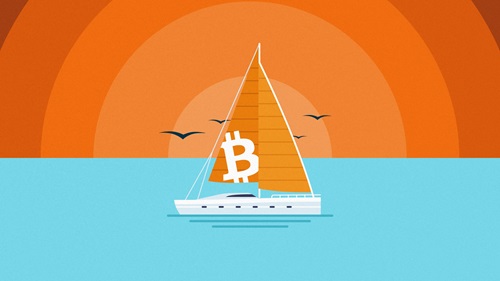I know what you’re thinking. There is a certain “type” of person who is drawn to digital “crypto” currencies, or assets, or whatever they’re called. Things like Bitcoin and Dogecoin and other “coins,” or whatever they’re called.
You can see those assets listed at Coinbase.com. There were 269 tradeable ones last time I checked. Another 300 or so were designated as not tradeable.
As for the type of person: My assumption has always been it’s someone not very much me. A crypto enthusiast is an overweight, unkempt 39-year-old geek named Larry, surrounded by Cheez-it bags and Diet Coke cans, staring absently at a half-dozen computer screens at a makeshift workstation in his parents’ basement.
Right?
For that reason, I have found it difficult to relate to the world of cryptocurrency. It just wasn’t part of my life.
But I have decided to ditch that mindset and learn about crypto; to start reading books and consuming social media and taking online courses on…on what, exactly?
It’s been hard to define what’s relevant or important. Hard to set the parameters. There is a kind of continuum between Bitcoin and other digital assets and the “block chain” and artificial intelligence and…
I’ve decided the parameters don’t matter at this point. Just get started. Stick with the study and I’m bound to be smarter after a month or a year.
Another question is why. Why should we care?
To me, it’s a way of connecting with the world. Or more precisely, re-connecting. Because frankly it has all gotten away from me. The broad realm of finance, technology and money has advanced in giant leaps, without me.
I want to catch up, but without turning into Larry.
—
Among the first mysteries is, why do these assets have any value? Bitcoin currently has a market capitalization of nearly 2 trillion dollars. (That’s the product of multiplying the number of outstanding coins by their value per coin, which is currently around $100,000.) It’s more than the market cap of Tesla stock but less than Amazon.
The current Bitcoin price has multiplied by 500 since 2015. Back then it was trading in the $200 range. One prominent analyst has projected Bitcoin could trade as high a $1.5 million by 2030. That’s another 15X increase.
Bitcoin is the king of the coins. At the other end are smaller ones with essentially zero market value, according to Coinbase.com. This I don’t understand. But again the question is, why do any digital coins, particularly the ones most highly valued, have any value at all?
To answer that, first think about money. Good old-fashioned dimes and dollar bills, and all the non-physical manifestations of money such as the electronic balance showing in your online bank account. Why does a dollar have value?
The U.S. dollar is a fiat currency. Fiat derives from the Latin, meaning “let it be done.” Fiat currency is declared by a government to have value. It is not necessarily backed by any physical asset. President Richard Nixon disconnected the dollar from the U.S. gold standard in 1971.
Suppose someone came along and designated a new currency. Suppose they said, bananas shall be the new currency. Or at least an alternative to the dollar. You’d buy a cup of coffee and the barista would say, that’ll be six bananas. Could someone do that?
Sure they could. The thing is, it would need to be widely adopted and accepted as currency. This is a major hurdle that’s been cleared, to a great extent, by some digital assets. You can now buy a car or make your mortgage payment with Bitcoin. I have heard of title companies accepting Bitcoin in real estate transactions.
But its value is too volatile for common everyday use. A car dealer may indeed accept payment of say, 0.38 Bitcoins. (Currently around $38,000.) They probably won’t hold that asset for any length of time. They’ll run to an online exchange such as Coinbase and trade their digital assets for dollars.
Someone’s willingness to accept Bitcoin is based confidence that they can in fact “cash it in” for dollars. The asset has value because enough people agree it has value.
—
Meanwhile, Bitcoin has big advantages over conventional money. One is anonymity. Transactions are recorded in something called a block chain. Which is a public ledger showing every Bitcoin transfer ever transacted, going back to its launch in 2008. Buyers and sellers are identified only by a public “key,” which is an outwardly meaningless string of code.
Another advantage is that the number of Bitcoins will forever be fixed. Eventually that number will be 21 million. That’s in contrast to dollars where the supply is continuously increased. It’s called inflation.
What does any of it have to do with real estate? I don’t know. At this point I just figure everything is connected to everything else.
###

